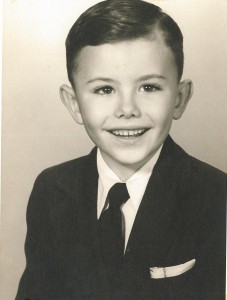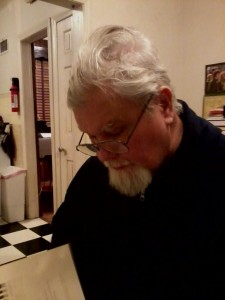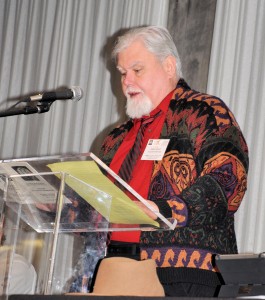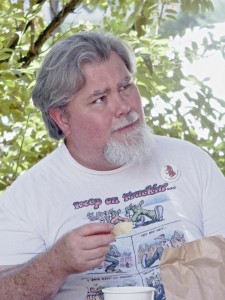⊃The founder of the Museum of Hidden History and the Hidden History Center was John Patrick Judge. John was an internationally acclaimed independent researcher, writer and speaker, as well as a lifelong dissident, anti-militarist, anti-racist activist and community organizer.
John was born on December 14, 1947, in Washington, DC, the only child of John Joseph Judge and Marjorie Cooley Judge. He grew up in Falls Church, Virginia. Both his parents worked at the Pentagon. John remembered reading in the Pentagon library as a child.
At a very young age, John became an advocate for truth. In grade school, teachers instructed him and other members of his class to practice for a nuclear attack, by crouching under their desks and covering their heads. John refused to participate in this exercise, arguing that a desk would not protect him from a nuclear blast. He soon found himself in the principal’s office.
 John graduated in 1969 from the University of Dayton in Ohio, where he studied theology and communications. During his college years, he objected to being required to participate in the Reserved Officers’ Training Corps, and he was an opponent of the Vietnam War. He later joined the American Friends Service Committee as a draft counselor. Thus began his life-long work as a peace activist and supporter of veterans and active duty soldiers.
John graduated in 1969 from the University of Dayton in Ohio, where he studied theology and communications. During his college years, he objected to being required to participate in the Reserved Officers’ Training Corps, and he was an opponent of the Vietnam War. He later joined the American Friends Service Committee as a draft counselor. Thus began his life-long work as a peace activist and supporter of veterans and active duty soldiers.
John eventually became what the Washington City Paper described as “the voice of military dissent in D.C. public schools.” In 1985, as part of his anti-war work, he co-founded CHOICES, an organization engaged in countering military recruitment in DC area high schools. He attended career days and spoke to classes, informing students of discrimination and deprivation of rights within the military.
An avid researcher, John turned his Washington D.C. home into a repository for thousands of volumes and documents on many subjects, including government surveillance, the erosion of civil liberties, U.S. covert actions around the world, political assassinations, 9/11 and its aftermath, the prison-industrial complex, the militarization of police, the U.S. corporate empire state, the corrosive effects of war, peace movements, government mind control, secret societies, civil rights, human rights, alternate economic systems, planet sustainability and a new social consciousness.
Throughout his life, John diligently amassed and disseminated evidence supporting alternative explanations for historical events. His primary areas of research included the assassinations of President John F. Kennedy, Robert Kennedy, Malcolm X and Dr. Martin Luther King, Jr. He also did groundbreaking work on the Jonestown Massacre.
 John was a co-founder of the Coalition on Political Assassinations (COPA), and organized COPA’s annual conferences in Dallas. Each year, John and others gathered on the Grassy Knoll, the spot where another gunman was stationed on the day of the assassination. Like legions of other concerned people labeled “conspiracy theorists,” John rejected the Warren Commission’s findings that Lee Harvey Oswald fired a gun that day. The 2013 COPA Conference, which John organized, drew more than 300 researchers and activists to Dallas on the 50th anniversary of President Kennedy’s death.
John was a co-founder of the Coalition on Political Assassinations (COPA), and organized COPA’s annual conferences in Dallas. Each year, John and others gathered on the Grassy Knoll, the spot where another gunman was stationed on the day of the assassination. Like legions of other concerned people labeled “conspiracy theorists,” John rejected the Warren Commission’s findings that Lee Harvey Oswald fired a gun that day. The 2013 COPA Conference, which John organized, drew more than 300 researchers and activists to Dallas on the 50th anniversary of President Kennedy’s death.
John was also the co-founder of 9/11 Citizens Watch, which monitored the operations of the official 9/11 Commission, the independent, bipartisan body created by Congress to prepare a full account of the attacks. John did investigative research on the background and details of the attacks, and he worked with family members of the victims to push for a Federal investigation.
From 2005 until 2007, John served as Special Projects Assistant to Congresswoman Cynthia McKinney of Georgia. One of his many undertakings in Congress was to advocate on behalf of active duty soldiers who received harsh sentences for declaring themselves conscientious objectors, and on behalf of others who claimed to have been tortured in military brigs. He helped write the Articles of Impeachment against President George W. Bush, which Congresswoman McKinney introduced in December 2006, before she left office. (A descendant of this work is the 2008 35 Articles of Impeachment by Rep Dennis Kucinich.)
Former Congressman Dennis Kucinich (D-Ohio) who met John during his Capitol Hill employment, described him as “brilliant” and said he had been “very impressed” by John’s research abilities. “I may not have agreed with him on everything,” Kucinich said, “but he was an original, independent thinker and someone who immersed himself in hidden history.”
Acclaimed nationally and internationally for his vast store of historical knowledge, John repeatedly warned against the rise of fascism and monopoly capitalism, both in the United States and worldwide. “It erodes the rational approach when you talk of conspiracies involving a small cabal in a board room controlling world history,” John once told the Boston Globe. “But it’s a common human trait to want an explanation for all the unexplained things that are happening – some kind of grand unified theory.”
John never married, and he had no children. Rather than having a family life, he chose to fully devote his energy to his causes. He also struggled financially most of his life, because he rarely sought or received compensation for his work.
 John earnestly believed that human consciousness was constantly evolving toward the perfection of Love. He said, “Love is my Religion,” and he was a deeply passionate and compassionate man. He turned his beliefs into action. He was in the forefront of the movement to oppose forced drugging and mistreatment of those diagnosed with mental illnesses, and he worked unceasingly on social justice causes, including fair treatment and civil rights for prisoners, women, people of color and the economically disadvantaged.
John earnestly believed that human consciousness was constantly evolving toward the perfection of Love. He said, “Love is my Religion,” and he was a deeply passionate and compassionate man. He turned his beliefs into action. He was in the forefront of the movement to oppose forced drugging and mistreatment of those diagnosed with mental illnesses, and he worked unceasingly on social justice causes, including fair treatment and civil rights for prisoners, women, people of color and the economically disadvantaged.
An avid public speaker, John never spoke about himself but rather, humbly retained a tireless devotion to the search for truth beyond the official government or mainstream media record. Until his final days, he was a seeker of truth and justice of the first order. He is irreplaceable in the annals of serious research and documentation.
At the time of his death on April 15, 2014, John was working to create a Hidden History Library and Research Center in Washington, DC. He intended to preserve his extensive collection there and to educate a new generation. He hoped to support the work of investigative researchers looking into the National Security State, the rise of secrecy, threats to civil liberties, government plans for extra-Constitutional jurisdiction during emergencies, and the ever-increasing power of the military-industrial complex.
The Hidden History Center, a project of the Museum of Hidden History, strives to be the fulfillment of John Judge’s vision.

